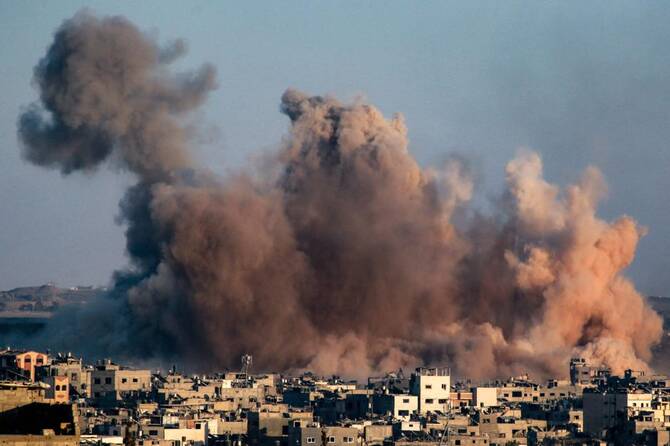Israeli attacks have killed at least 14 Palestinians across the Gaza Strip since dawn today, deepening the humanitarian crisis and spreading fear among displaced families. Among the dead are nine civilians who were simply trying to access food aid, underscoring the growing toll on non-combatants amid Israel’s intensified campaign.
Health officials reported that 11 people were brought dead to al-Awda Hospital in northern Gaza. Six of them were killed while waiting for food near the Netzarim Corridor, a heavily militarized area under Israeli control. Humanitarian groups have repeatedly warned that attacks in such zones severely jeopardize aid access and violate international law.
Two more individuals were killed and transported to the Nasser Medical Complex in southern Gaza, reportedly targeted while attempting to collect relief supplies from a Gaza Health Foundation (GHF) distribution site. A separate Israeli airstrike on an apartment building in Khan Younis killed one woman and injured another civilian, according to local sources.
The escalation comes as Israel’s military pushes further into the densely populated coastal enclave. The current operation, widely seen as a step toward full control of the Gaza Strip, follows months of warnings by international organizations about rising civilian casualties and the targeting of essential infrastructure and services.
Trump Administration Silent on Israeli Escalation
Despite the mounting toll, there has been no explicit reaction from the Trump administration to Israel’s latest moves. This silence persists even after reports emerged in February that U.S. President Donald Trump privately discussed a plan with Israeli Prime Minister Benjamin Netanyahu to “relocate” Gaza’s population to neighboring countries. While the White House has since downplayed those discussions, many Palestinians and observers fear that today’s operations reflect a real effort to implement such a strategy.
Read more: Pakistan Backs Global Mediation on Kashmir Dispute
In the hours since the current wave of attacks, the Trump administration has not issued any statement urging restraint or condemning the targeting of civilians. Instead, Washington appears to be maintaining a distance, neither endorsing nor opposing Israel’s continued aggression. This has been the pattern in recent months: a vague position on Gaza’s fate while giving Israel wide latitude in its military approach.
Palestinians across Gaza are living in a constant state of anxiety. Displacement has become routine, but no less traumatic. In central Gaza, families reported being awakened by gunfire and explosions, then immediately discussing where they might flee next. One father, standing outside a tent in a crowded displacement site, said it was the fifth time he’d been forced to move with his eight children. “Where can we go now?” he asked. “Al-Mawasi? Or Deir el-Balah again?”
He spoke with pain and exhaustion, voicing the fears shared by thousands of others: that nowhere is safe, that no aid corridor is reliable, and that the endgame could be mass expulsion or permanent occupation.
Read more: Trump-Modi Ceasefire Dispute Deepens Diplomatic Rift
“What is going to be left of Gaza?” another resident asked aloud, after a night filled with rumors of more ground operations. “Are we even going to have a home tomorrow?”
International Condemnation, But No Effective Action
International watchdogs, including the UN and human rights groups, have condemned repeated Israeli strikes on aid seekers and warned that deliberate attacks on civilians could amount to war crimes. However, these statements have done little to curb the Israeli campaign, which has steadily advanced despite mounting global concern.
Israel’s government defends its operations as necessary to “eliminate threats” posed by armed factions within Gaza. But critics argue that the strategy punishes the entire civilian population and sets the stage for long-term occupation—if not outright depopulation.
In conversations with displaced families and local aid workers, the sense of abandonment is palpable. Many express deep frustration not just with Israel, but also with the international community’s perceived inaction.
“We’re being erased, one family at a time,” said a school teacher sheltering in a makeshift camp outside Deir el-Balah. “And the world is just watching.”
Gaza Braces for More Attacks
With the Israeli military now surrounding major parts of Gaza City and reportedly preparing for expanded operations, residents are bracing for more bloodshed. Aid agencies say the situation is approaching catastrophic levels, with access to food, water, and medical care diminishing by the hour.
As of now, there are no signs of de-escalation. And with at least 14 more lives lost today—nine of them killed while seeking food—many fear that Gaza’s worst days may still lie ahead.
Follow us on Instagram, YouTube, Facebook,, X and TikTok for latest updates
